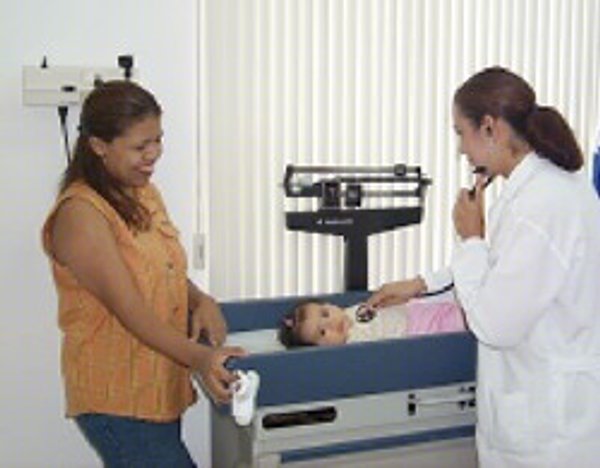La Silla Hill, symbol of Monterrey, is the backdrop for the route of the crowds of people who go to the Centennial Medical Unit. A bus makes three runs each week to pick up patients from the Unidad Piloto district, one of the 24 barrios in which the new Medical Unit is being promoted. "Your health and your family’s health are the first thing," and other such phrases, are heard through the streets as the bus passes by, announcing the clinic’s medical services.
The Medical Unit, located on the campus of the Ciudad de los Niños of Monterrey, forms part of a Center for Social Development that also offers families of limited resources other ways of improving their life conditions: education, technical preparation, and spiritual and human formation.
Each day dozens of people from the most needy areas of the city come through for consultations with specialists in family and internal medicine. "At the beginning it was not easy, we were a little afraid," comments one patient, "until we saw that the doctors were good. I got better with the medicine they gave me, and I feel grateful to them for thinking of us."

In the Ciudad de los Niños
The Ciudad de los Niños, which covers 25 hectares, was an orphanage started in 1951 by Fr. Carlos Álvarez, and supported by many people in the Monterrey area, especially by a group of generous businessmen.
In the mid-80s it began focusing its efforts on dealing with the root causes of the problem of abandoned children. Its new emphasis on the family and on job-training crystallized in 1986 with the establishment of two primary and secondary education centers, one for boys and another for girls; a family guidance school; an institute for training teachers; various trade workshops, such as carpentry, welding, computers, beauty, tailoring and dressmaking. These programs were united to spiritual and human formation, which was entrusted to the Prelature of Opus Dei. More than 700 families participate today in the formational work of the Ciudad de los Niños.
The missing piece
At the beginning of the Ciudad de los Niños’ new phase, many efforts were already being made to give medical attention to children. A file was kept for each one (around a thousand), and a clinic was fitted out to conduct regular medical exams.
In 1998 the opportunity arose to set up a better clinic, due to the appearance of a donor who wished to remain anonymous. He wanted to provide half of the costs for the construction and equipping of a free medical dispensary for people with scarce resources. He was put in contact with the directors of the Ciudad de los Niños, and in agreement with them decided upon the construction of a medical unit with five examining rooms, a waiting room, an office, a pharmacy and a reception area.
The opening ceremony for the Centennial Medical Unit took place on January 19, 2002. The clinic owes its name to the commemoration of the 100th anniversary of the birth of the founder of the Opus Dei.

The human side of practicing medicine
Besides curing patients, the Centennial Medical Unit carries out a preventive mission. Each semester it develops various health education campaigns, from how to create healthy life habits to how to detect some types of cancer on a timely basis. "The dedication of this charitable project to St. Josemaría," commented Dr. Luis Carlos Menéndez, director of the Medical Unit, "is a both a well-deserved homage and a statement of principles. We want to humanize medicine, to treat each patient with the attention and kindness that we would give to a friend. In the end, we seek to see in each patient," as the founder of Opus Dei used to say, "Christ himself."
The Centennial Medical Unit is just the beginning of a welfare project which is expected to be converted into a hospital eventually. "Counting on the aid of St. Josemaría and the Ciudad de los Niños’ contributors," says Dr. Menéndez, "we are confident that this dream will be carried out."
